 32 citations,
January 2012 in “Clinical & Developmental Immunology”
32 citations,
January 2012 in “Clinical & Developmental Immunology” Targeting CD200 could be a new treatment for rheumatoid arthritis.
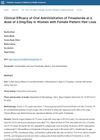 February 2022 in “Pakistan Journal of Medical and Health Sciences”
February 2022 in “Pakistan Journal of Medical and Health Sciences” Taking 2.5mg of finasteride daily can effectively improve hair loss in 62% of women, especially those pre-menopause or with less severe hair loss.
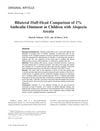 24 citations,
January 2017 in “Pediatric dermatology”
24 citations,
January 2017 in “Pediatric dermatology” 1% anthralin ointment is effective and safe for treating severe alopecia areata in children.
 9 citations,
June 2019 in “Archives of Dermatological Research”
9 citations,
June 2019 in “Archives of Dermatological Research” Both topical calcipotriol and narrowband UVB improved alopecia, but combining them didn't enhance the effect on hair loss severity, despite higher vitamin D3 levels.
 September 1997 in “Journal of the European Academy of Dermatology and Venereology”
September 1997 in “Journal of the European Academy of Dermatology and Venereology” Hirsute women with ovarian-sourced hirsutism are more likely to have irregular periods, with higher BMI and altered hormone ratios.
 6 citations,
May 2023 in “Drugs”
6 citations,
May 2023 in “Drugs” Baricitinib helps regrow hair in adults with severe alopecia better than a placebo and is approved for treatment, but long-term effects are still unknown.
 September 2023 in “British Journal of Dermatology”
September 2023 in “British Journal of Dermatology” Hair regrowth from severe alopecia areata treatment with baricitinib can vary, with faster results in those with shorter hair loss duration.
 1 citations,
September 2022 in “Journal of The American Academy of Dermatology”
1 citations,
September 2022 in “Journal of The American Academy of Dermatology” Baricitinib helps grow eyebrows and eyelashes in severe alopecia areata patients.
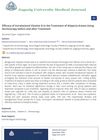 June 2024 in “Zagazig University Medical Journal”
June 2024 in “Zagazig University Medical Journal” Intralesional vitamin D is mildly effective for treating Alopecia Areata.
 December 2023 in “Journal of health and rehabilitation research”
December 2023 in “Journal of health and rehabilitation research” Oral Apremilast effectively treats alopecia areata in most patients.
 April 2021 in “Journal of evolution of medical and dental sciences”
April 2021 in “Journal of evolution of medical and dental sciences” Women with PCOS have higher levels of certain androgens, which are good at predicting excess hair growth.
 December 2023 in “Clinical, cosmetic and investigational dermatology”
December 2023 in “Clinical, cosmetic and investigational dermatology” The new method combining dermoscopy and Reflectance Confocal Microscopy is more effective for evaluating vitiligo.
 13 citations,
February 2019 in “Journal of the American Academy of Dermatology”
13 citations,
February 2019 in “Journal of the American Academy of Dermatology” The document concludes that a new system using the SALT score should replace the current alopecia areata classification for better accuracy in assessing severity and prognosis.
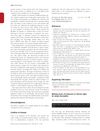 November 2017 in “British Journal of Dermatology”
November 2017 in “British Journal of Dermatology” The electronic version of the Dermatology Life Quality Index is as effective as the paper version, with most patients preferring it.
 1 citations,
February 2024 in “JEADV. Journal of the European Academy of Dermatology and Venereology/Journal of the European Academy of Dermatology and Venereology”
1 citations,
February 2024 in “JEADV. Journal of the European Academy of Dermatology and Venereology/Journal of the European Academy of Dermatology and Venereology” Baricitinib effectively promotes long-term hair regrowth in alopecia areata patients.
 22 citations,
January 2019 in “Endocrinology and metabolism”
22 citations,
January 2019 in “Endocrinology and metabolism” An mFG score of 7 or higher indicates hirsutism in Filipino women, often linked to higher free testosterone levels.
 February 2018 in “The Journal of Sexual Medicine”
February 2018 in “The Journal of Sexual Medicine” Natesto nasal gel improves erectile function and mood in men with low testosterone within 30 days.
 4 citations,
February 2016 in “Clinical Pharmacology & Therapeutics”
4 citations,
February 2016 in “Clinical Pharmacology & Therapeutics” Hair follicle samples effectively show how well the drug MK-0752 targets and engages with the Notch pathway.
 124 citations,
October 2019 in “Frontiers in Immunology”
124 citations,
October 2019 in “Frontiers in Immunology” Janus kinase inhibitors are promising treatments for autoimmune skin diseases like eczema and psoriasis.
4 citations,
August 2015 in “JEADV. Journal of the European Academy of Dermatology and Venereology/Journal of the European Academy of Dermatology and Venereology” Both fixed and incremental laser treatments effectively reduced underarm hair, but the fixed method was less painful.
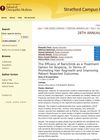
Baricitinib effectively promotes hair regrowth in severe alopecia with minimal side effects.
 2 citations,
July 2023 in “Journal of Cosmetic Dermatology”
2 citations,
July 2023 in “Journal of Cosmetic Dermatology” The topical treatment reduced hair loss and improved hair growth in patients with certain types of hair loss.
 9 citations,
November 2015 in “Gynecological Endocrinology”
9 citations,
November 2015 in “Gynecological Endocrinology” Different types of PCOS in Chinese Han women show varying levels of male hormone and metabolic issues.
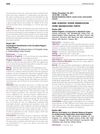
The data suggests that dosing differences can help manage spasticity in patients with upper motor neuron dysfunction.
 30 citations,
March 2015 in “Clinical Endocrinology”
30 citations,
March 2015 in “Clinical Endocrinology” Young women with high male hormone levels or PCOS often feel more psychological distress and have a lower quality of life.
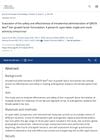 2 citations,
January 2022 in “Journal of Cosmetic Dermatology”
2 citations,
January 2022 in “Journal of Cosmetic Dermatology” QR678 Neo® is a safe and effective treatment for hair loss in men and women.
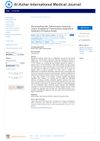
Microneedling with Triamcinolone acetonide is an effective, less invasive, and safe alternative to direct injections for treating alopecia areata.
 10 citations,
January 2007 in “Journal of cosmetic and laser therapy”
10 citations,
January 2007 in “Journal of cosmetic and laser therapy” The IPL device is safe, effective, and has high patient satisfaction for hair removal.
 13 citations,
May 1996 in “Archives of Disease in Childhood”
13 citations,
May 1996 in “Archives of Disease in Childhood” Siblings with signs of virilization should be tested for non-classical congenital adrenal hyperplasia, which does not affect adult height but may impact fertility and well-being if untreated.
24 citations,
April 2021 in “BMC women's health” High BMI worsens hair growth in women with PCOS.




























